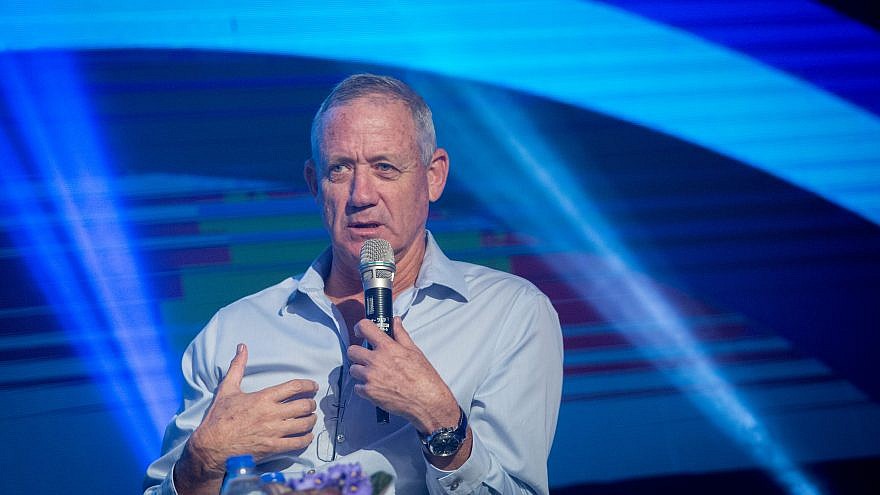In the race to defeat reigning Israeli Prime Minister Benjamin Netanyahu at the ballots in April, polls show that to date, none of the current opposition party leaders can secure enough mandates to force Netanyahu to the back benches.
Enter Gen. Benny Gantz, a former Israel Defense Forces’ Chief of Staff, who is the latest newcomer to explode onto the Israeli political scene, and the latest former military head to advance into the political arena after career retirement.
Gantz officially registered a new political party, Hosen L’Yisrael (“Resilience for Israel”) . It being positioned as “centrist” calls for “the continued development and strengthening of Israel as a Jewish and democratic state according to the Zionist vision as it is expressed in the Declaration of Independence, while establishing and changing national priorities in the fields of education, development of national infrastructure, agriculture, rule of law and internal security, peace and security.”
Gantz has never held public office; his political, economic and social views are virtually unknown to the public. Yet his party is already outpolling current opposition parties, including Yesh Atid, led by former Finance Minister Yair Lapid, and Zionist Union, led by former Labor leader Avi Gabbay.
Despite the initial polling numbers, Hebrew University political-science Professor Avraham Diskin told JNS that he does not expect Gantz to have a major impact on Netanyahu’s re-election chances. “I don’t see the center-left uniting to mount a serious challenge,” he said.
Gantz is not the only former chief of staff hoping to make waves in the election. It has been widely speculated that Gantz will be joined by Moshe Ya’alon, a former member of the Likud Party who previously served as Netanyahu’s defense minister. Ya’alon has recently been an outspoken critic of Netanyahu and was replaced as defense minister in 2016 by Avigdor Lieberman. Last week, Ya’alon similarly announced that he would form his own political party, although it is likely that he will join forces with Gantz.
Yet another former IDF chief of staff being rumored to potentially join “Resilience for Israel” is former Prime Minister Ehud Barak, who initially appointed Gantz as chief of staff, and who recently stated that he may resurrect his political career at age 76 if a serious center-left political bloc is formed to challenge Netanyahu.
Israeli political history has been filled with former IDF heads entering politics, some with greater and some with lesser success. Yigal Yadin, Moshe Dayan, Yitzhak Rabin, Haim Bar-Lev, Mordechai Gur, Raphael Eitan, Ehud Barak, Amnon-Lipkin Shahak and Shaul Mofaz all reached cabinet positions after serving in the military. Both Rabin and Barak went on to serve as premier. Former Prime Minister Ariel Sharon was also a decorated IDF general, though never in the top slot.
In a nation that was born in war and continues to face existential threats, Israeli military leaders are on the public stage, giving those who have been successful on the battlefield an easier path into the political arena. Once there, former IDF chiefs sometimes have difficulty making the necessary adjustments to become successful politicians, but almost all garnered enough initial support to get them elected in the first place.
‘A microscope of scrutiny’
So who is Gantz, and why are so many voters flocking to him?
At 59, Gantz left the military in 2015 after a four-year stint as head of the IDF. Born in Moshav Kfar Ahim in south-central Israel, he is the son of a Romanian immigrant father and a mother who is a Hungarian Holocaust survivor. Most Israeli citizens remember Gantz for his leadership of the armed forces during the 2014 Gaza conflict, “Operation Protective Edge.” He portrays the image of a solid, serious military man—attractive along the lines of Netanyahu and stalwart in the image of Rabin.
Political consultant Mitchell Barak from Keevoon Strategics suggests that Gantz’s current poll numbers are inflated and will not last. “There is hype and media frenzy about the newcomer, but he is currently a beauty queen with no blemishes,” Barak told JNS. “His candidacy will now come under a microscope of negative scrutiny.”
A poll by the Walla news site in recent days found that Gantz, running with his own party, would finish second with 14 Knesset mandates—less than half of the 31 mandates projected for Netanyahu’s Likud Party. The same poll found that if Gantz were run together with Yair Lapid’s Yesh Atid Party, the joint list would win 26 seats, only five behind Likud at 31.
Both Yesh Atid and Zionist Union each reportedly tried unsuccessfully to get the retired general to join their ranks, as Gantz does not wish to associate with the left-wing parties that have failed to unseat Netanyahu in three consecutive elections. The strong emergence of Gantz in the polls is putting immense pressure on the two parties who are still proclaiming themselves to be the “only real” challengers to Netanyahu. Yet both left-wing parties are polling well behind Likud, and many of their longtime supporters are now seriously considering Gantz’ candidacy.
Neither Yesh Atid, Zionist Union or the new Resilience for Israel appear to have the political momentum necessary to unseat the battle-tested Netanyahu, though the race to the polls has just officially started.
Former Yesh Atid Knesset member Dov Lipman told JNS, “It’s not possible that Netanyahu and Likud will be defeated by any single party. Only a united opposition has a chance to defeat him. Unfortunately, I do not see that happening due to the egos of the opposition leaders.”


























